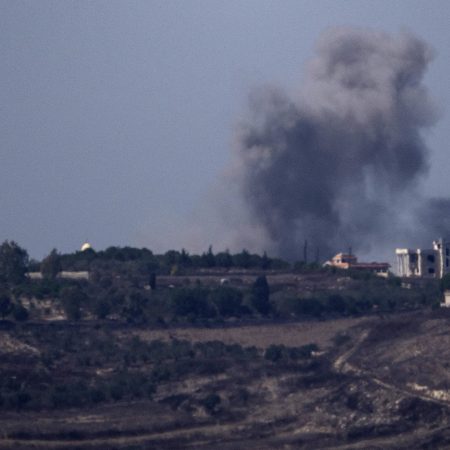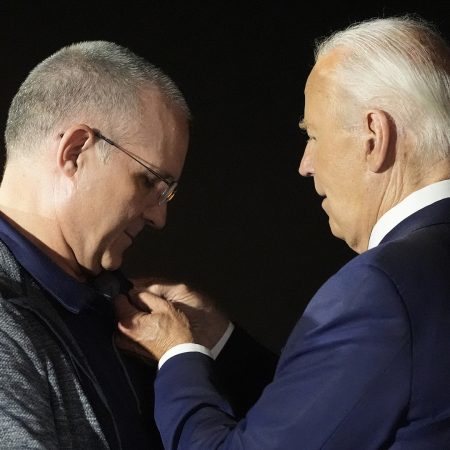Iran fires at least 180 missiles into Israel as regionwide conflict grows
JERUSALEM (AP) — Iran launched at least 180 missiles into Israel on Tuesday, the latest in a series of escalating attacks in a yearslong conflict between Israel and Iran and its Arab allies that threatens to push the Middle East closer toward a regionwide war.
The orange glow of missiles streaked across Israel’s night sky as air raid sirens sounded and residents scrambled into bomb shelters. Israel vowed retaliation for Iran’s barrage, which it said had caused only a few injuries.
Before Iran’s attack, Israel had landed a series of devastating blows in recent weeks against the leadership of Hezbollah in Lebanon. It then ratcheted up the pressure on the Iran-backed militant group — which has been firing rockets into Israel since the war in Gaza began — by launching what it said is a limited ground incursion in southern Lebanon.
Israel has said it will continue to strike Hezbollah until it is safe for citizens displaced from homes near the Lebanon border to return. Hezbollah has vowed to keep firing rockets into Israel until there is a cease-fire in Gaza with Hamas, which is also supported by Iran.
Israeli military spokesman Rear Adm. Daniel Hagari said the country’s air defenses intercepted many of the incoming Iranian missiles, though some landed in central and southern Israel. Israel’s national rescue service said two people were lightly wounded by shrapnel. In the West Bank, Palestinian officials said a Palestinian man was killed by a missile that fell near the town of Jericho, though it wasn’t clear where the attack originated.
Israeli Prime Minister Benjamin Netanyahu vowed late Tuesday to retaliate against Iran, which he said “made a big mistake tonight and it will pay for it.”
Israel and Iran have fought a shadow war for years, but rarely have they come into direct conflict.
Israel considers Iran to be its greatest foe — citing Iran’s repeated calls for Israel’s destruction, its support for Arab militant groups and its nuclear program. Iran denies Israeli accusations that it is developing a nuclear weapon.
A high-ranking Iranian commander warned Iran would hit Israel’s entire infrastructure if the Jewish state takes any action against its territory. Iran’s armed forces joint chief of staff Gen. Mohammad Bagheri said the Revolutionary Guard was prepared defensively and offensively to repeat Tuesday’s attack with “multiplied intensity.”
Moments before Iran launched its missiles, a shooting attack in Tel Aviv left at least six people dead, police said, adding that the two suspects who had opened fire on a boulevard in the Jaffa neighborhood had also been killed.
White House National Security Adviser Jake Sullivan called Iran’s missile attack a “significant escalation,” although he said it was ultimately “defeated and ineffective,” in part because of assistance from the U.S. military in shooting down some of the inbound missiles. President Joe Biden said his administration is “fully supportive” of Israel and that he’s in “active discussion” with aides about what the appropriate response should be to Tehran.
The U.N. Security Council scheduled an emergency meeting for Wednesday morning to address the escalating situation in the Middle East.
Iran launched another direct attack on Israel in April, but few of its projectiles reached their targets. Many were shot down by a U.S.-led coalition, while others apparently failed at launch or crashed in flight.
Iran said it fired Tuesday’s missiles as retaliation for attacks that killed leaders of Hezbollah, Hamas and the Iranian military. It referenced Hezbollah leader Hassan Nasrallah and Revolutionary Guard Gen. Abbas Nilforushan, both killed in an Israeli airstrike last week in Beirut. It also mentioned Ismail Haniyeh, a top leader in Hamas who was assassinated in Tehran in a suspected Israeli attack in July.
Earlier Tuesday, Israel said it had begun limited ground operations against Hezbollah in southern Lebanon.
Israeli airstrikes and artillery fire pounded southern Lebanese villages, and Hezbollah responded with a barrage of rockets into Israel. There was no immediate word on casualties.
While Hezbollah denied Israeli troops had entered Lebanon, the Israeli army announced it had also carried out dozens of covert ground raids into southern Lebanon going back nearly a year.
If true, it would be another humiliating blow for Hezbollah, the most powerful armed group in the Middle East. Hezbollah has been reeling from weeks of targeted strikes that killed Nasrallah and several of his top commanders.
On Tuesday morning, Israel warned people in southern Lebanon to evacuate to the north of the Awali River, some 60 kilometers (36 miles) from the border and much farther than the Litani River, which marks the northern edge of a U.N.-declared zone intended to serve as a buffer between Israel and Hezbollah after their 2006 war.
The border region has largely emptied out over the past year as the two sides have traded fire. But the scope of the evacuation warning raised questions as to how deep Israel plans to send its forces into Lebanon.
Questions raised over whether Israeli forces entered
An Associated Press reporter saw Israeli troops operating near the border in armored trucks, with helicopters circling overhead, but could not confirm ground forces had crossed into Lebanon.
Ahead of the Israeli announcement of an incursion, U.S. officials on Monday said Israel had described launching small ground raids inside Lebanon as it prepared for a wider operation.
U.N. spokesman Stephane Dujarric said Tuesday the U.N. peacekeeping force in southern Lebanon has seen sporadic incursions by Israeli military forces, but “they have not witnessed a full-scale invasion.”
Hagari, the Israeli army spokesman, said Israel had carried out dozens of small raids inside Lebanon since Oct. 8, when Hezbollah began firing rockets into Israel after the outbreak of the war in Gaza. He said Israeli forces had crossed the border to collect information and destroy Hezbollah infrastructure, including tunnels and weapons. Israel has said Hezbollah was preparing its own Oct. 7-style attack into Israel. It was not immediately possible to confirm those claims.
Hagari said Israel’s aims for its current ground offensive in Lebanon were limited. “We’re not going to Beirut,” he said.
The Israeli military was accused of lying to the media in 2021 when it released a statement implying ground troops had entered Gaza. The military played down the incident as a misunderstanding, but well-sourced military commentators in Israel said it was part of a ruse to lure Hamas into battle.
Israel strikes more targets and Hezbollah fires rockets
The Israeli military said Hezbollah had launched rockets at central Israel on Tuesday, setting off air raid sirens and wounding a man. Hezbollah said it fired salvos of a new kind of medium-range missile at the headquarters of two Israeli intelligence agencies near Tel Aviv. Hezbollah had also launched projectiles at Israeli communities near the border, targeting soldiers without wounding anyone.
Israel’s statements indicated it might focus its ground operation on the narrow strip along the border, rather than launching a larger invasion aimed at destroying Hezbollah, as it has attempted in Gaza against Hamas.
Hezbollah and Hamas are close allies backed by Iran, and each escalation has raised fears of a wider war in the Middle East that could draw in Iran and the United States, which has rushed military assets to the region in support of Israel.
Israeli strikes have killed over 1,000 people in Lebanon over the past two weeks, nearly a quarter of them women and children, according to the Health Ministry. Hundreds of thousands have fled their homes.
Hezbollah is a well-trained militia, believed to have tens of thousands of fighters and an arsenal of 150,000 rockets and missiles. The last round of fighting in 2006 ended in a stalemate, and both sides have spent the past two decades preparing for their next showdown.
Recent airstrikes wiping out most of Hezbollah’s top leadership and the explosions of hundreds of pagers and walkie-talkies belonging to Hezbollah indicate Israel has infiltrated deep inside the group’s upper echelons.
The group’s acting leader, Naim Kassem, said Monday that Hezbollah commanders killed in recent weeks have already been replaced.
As the fighting intensifies, European countries have begun pulling their diplomats and citizens out of Lebanon.
Reporting by Melanie Lidman, Aamer Madhani and Bassem Mroue. Associated Press. Associated Press writers Kareem Chehayeb, Zeke Miller and Lolita C. Baldor contributed.
The post Iran fires at least 180 missiles into Israel as regionwide conflict grows appeared first on WDET 101.9 FM.

